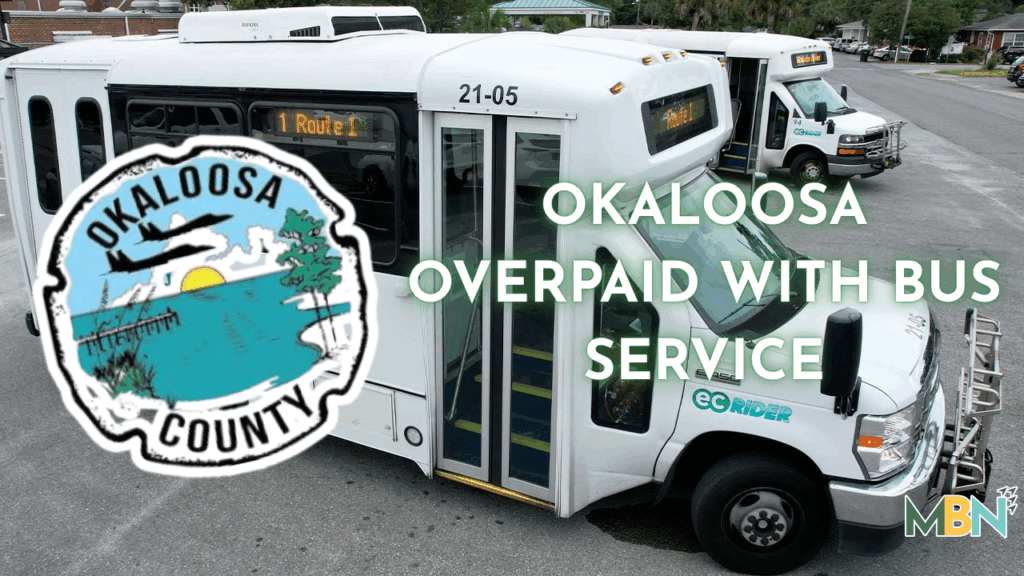
🚌 Over $850K in transit overpayments revealed
📄 97% of invoices found inaccurate or incomplete
✅ County implements new RFP and digital fare system
SHALIMAR — Six years of unchecked billing and oversight lapses have cost Okaloosa County nearly $1 million — now the county is rolling out reforms to restore accountability.
For more than six years, Okaloosa County officials failed properly oversee their public transit contractor, allowing unauthorized billing changes, missing documentation, and lax enforcement that led to more than $850,000 in overpayments, according to a new audit by the county’s Inspector General.
The 35-page report, released Oct. 17 by Inspector General Renee Larkey, depicts a county transit system riddled with weak internal controls and a contractor, MV Transportation, Inc., that repeatedly failed to meet its obligations. It concludes that both sides violated the terms of their agreements, leaving taxpayers footing the bill for years of unverified charges and administrative lapses.
“MV did not consistently fulfill its contractual, amendment, and lease obligations,” the report states. “This was enabled by the County not providing adequate oversight to ensure MV’s performance and compliance with all agreements’ terms and conditions.”
For context, in the new county budget passed earlier this year, Okaloosa County approved a $10.45 million budget for the transit department. Of that budget, Okaloosa County taxpayers are on the hook for $88,694. All other funds are from state and federal grants.
The Inspector General’s office reviewed the county’s 2019–2025 transit contract and vehicle lease with MV Transportation, which operates Okaloosa’s bus and paratransit services. Over that period, auditors found that nearly every invoice submitted by MV contained errors or lacked required documentation, and that county officials rarely verified the bills before approving payment.
The most serious lapse stemmed from a verbal agreement made in late 2019 between the county’s Transit Director, Tyrone Parker, who has held the position since 2018, and MV’s General Manager. That handshake deal allowed MV to bill “deadhead” hours — the time buses spend traveling without passengers — as revenue service hours eligible for reimbursement.
The unauthorized change, auditors said, was never approved by the Board of County Commissioners or documented through a contract amendment, as county policy requires. Between 2019 and 2025, the practice led to an estimated $850,000 in overpayments.
In addition, auditors found that MV failed to make even symbolic $1 lease payments for its use of county-owned vehicles, missed insurance documentation deadlines by months, and lacked required records for staff training and drug-testing compliance.
The county, meanwhile, failed to assess penalties, renew leases on time, or collect $50,000 in fees related to management personnel changes.
In a written response, a spokesman for the Okaloosa County Commission acknowledged the county’s failures and said corrective measures are underway.
“The county’s transit system has been steadily evolving with substantial improvements over the last seven years despite the COVID-19 pandemic, economic fluctuations, issues with wages, recruitment, and retention of employees, and the complexities related to multiple funding streams,” the spokesman said.
“We concur that the county’s oversight of the contract with MV was less than effective. The County is working to set up a training for transit staff related to contract management, insurance compliance and to ensure that transit staff have the proper tools and knowledge to improve in the areas of deficiencies noted within this report.”
The county also addressed the audit’s most consequential finding — the unauthorized change that inflated payments to MV.
“With regards to Finding 1, which the Clerk’s Inspector General determined to be an unauthorized contract alteration resulting in the County potentially overpaying MV Transportation, we concur that the decision to allow MV to bill for deadhead hours should have been handled via a contract amendment; however, this oversight was not intentional,” the spokesman said.
“The decision to authorize a change in the calculation of revenue hours billed was made in the best interest of Okaloosa County and continuity of the County’s paratransit operations.”
Beyond the billing issue, the audit documents a pattern of noncompliance by both the county and its contractor:
The Inspector General noted that these failings did not necessarily indicate fraud but reflected “a sustained absence of internal controls, accountability, and documentation.”
In a citizen survey conducted as part of the audit, 72 percent of respondents said they were aware of Okaloosa’s public transit service. Still, fewer than one in five felt the county’s outreach was effective. Many cited limited availability, inconvenient routes, or a lack of information about fares.
Auditors recommended that the county modernize fare collection by introducing digital and card payments, consolidate its contracts and leases into a single, clearer document, and implement more rigorous vehicle maintenance standards aligned with manufacturer guidelines.
They also urged the county to set measurable marketing benchmarks — a first for the small transit system that serves both fixed routes and on-demand paratransit across the county.
County leaders say many of those recommendations have already been incorporated into a new Request for Proposal for a transit provider, effective Jan. 1, 2026.
The updated RFP clarifies definitions, such as “vehicle revenue hours,” reinstates strict documentation requirements, and sets a mid-2026 deadline for the rollout of digital fare payments.
Deputy County Administrator Sheila Fitzgerald, who helped draft the response, said the new contract language is meant to prevent ambiguity and reinforce accountability.
The Inspector General’s office concluded that the county’s weaknesses in oversight “may weaken public confidence in the County’s ability to safeguard resources, ensure accountability, and deliver services effectively.”
The audit stops short of alleging misconduct but calls for stricter financial controls, formal training and periodic compliance reviews to rebuild credibility.
For now, Okaloosa County continues to operate its bus system under MV Transportation until the current contract expires at the end of 2025 — the same period auditors say will test whether the county has learned from its own report.
Register or login with Mid Bay News and never get another pop up on our site!